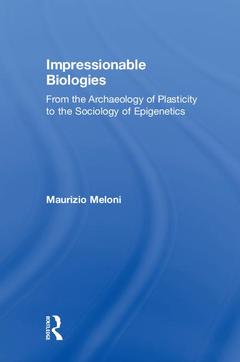Description
Impressionable Biologies
From the Archaeology of Plasticity to the Sociology of Epigenetics
Author: Meloni Maurizio
Language: English
Subjects for Impressionable Biologies:
Keywords
Epigenome Wide Association Studies; Biology and society; DNA Methylation; epigenetics; FASD; political biology; Fetal Alcohol Spectrum Disorder; Biopolitics; Aboriginal Community Controlled Health Organisation; Genetics; Low DNA Methylation Level; Genetics and society; Generation DNA Methylation; Science and technology studies; DNA Fiber; epistemology; Corporeal Plasticity; history of science; Maternal Foetal Microchimerism; Sociology of knowledge; DNA String; Darwinism; Prenatal Cigarette Smoking; theories of evolution; Extragenic DNA; humoralism; Chromatin Research; eugenics; DNA Stretch; Junk DNA; DNA Information; Ancient DNA; DNA Methylation Level; Moist Object; Maternal Impressions
Approximative price 172.36 €
In Print (Delivery period: 14 days).
Add to cartPublication date: 01-2019
· 15.2x22.9 cm · Hardback
Publication date: 01-2019
· 15.2x22.9 cm · Paperback
Description
/li>Contents
/li>Readership
/li>Biography
/li>
During the twentieth century, genes were considered the controlling force of life processes, and the transfer of DNA the definitive explanation for biological heredity. Such views shaped the politics of human heredity: in the eugenic era, controlling heredity meant intervening in the distribution of "good" and "bad" genes. However, since the turn of the twenty-first century, this centrality of genes has been challenged by a number of "postgenomic" disciplines. The rise of epigenetics in particular signals a shift from notions of biological fixedness to ideas of plasticity and "impressionability" of biological material.
This book investigates a long history of the beliefs about the plasticity of human biology, starting with ancient medicine, and analyses the biopolitical techniques required to govern such permeability. It looks at the emergence of the modern body of biomedicine as a necessary displacement or possibly reconfiguration of earlier plastic views. Finally, it analyses the returning of plasticity to contemporary postgenomic views and argues that postgenomic plasticity is neither a modernistic plasticity of instrumental management of the body nor a postmodernist celebration of potentialities. It is instead a plasticity that disrupts clear boundaries between openness and determination, individual and community, with important implications for notions of risk, responsibility and intervention.
Preface and Acknowledgements: Problematizing the Turn to Plasticity Chapter One: An Archaeology of Plasticity Chapter Two: Plasticity before Plasticity: The Humoralist Body Chapter Three: Taming Plasticity: Darwin, Selectionism, and Modern Agency Chapter Four: Epigenetics or How Matter Returned to the Genome Chapter Five: A Sociology of the Body After the Genome References Index
MaurizioMeloni is a social theorist and a science and technology studies scholar. He is the author of Political Biology (Palgrave 2016), co-editor of Biosocial Matters (Wiley 2016), and chief editor of the Palgrave Handbook of Biology and Society (2018). He is Associate Professor of Sociology at Deakin University, Australia.



